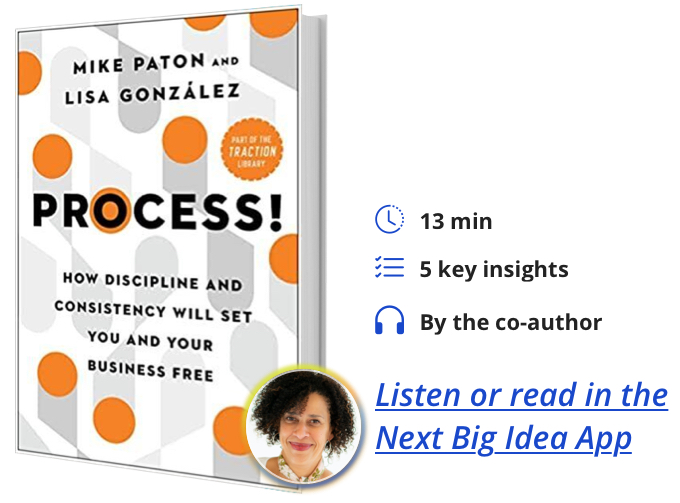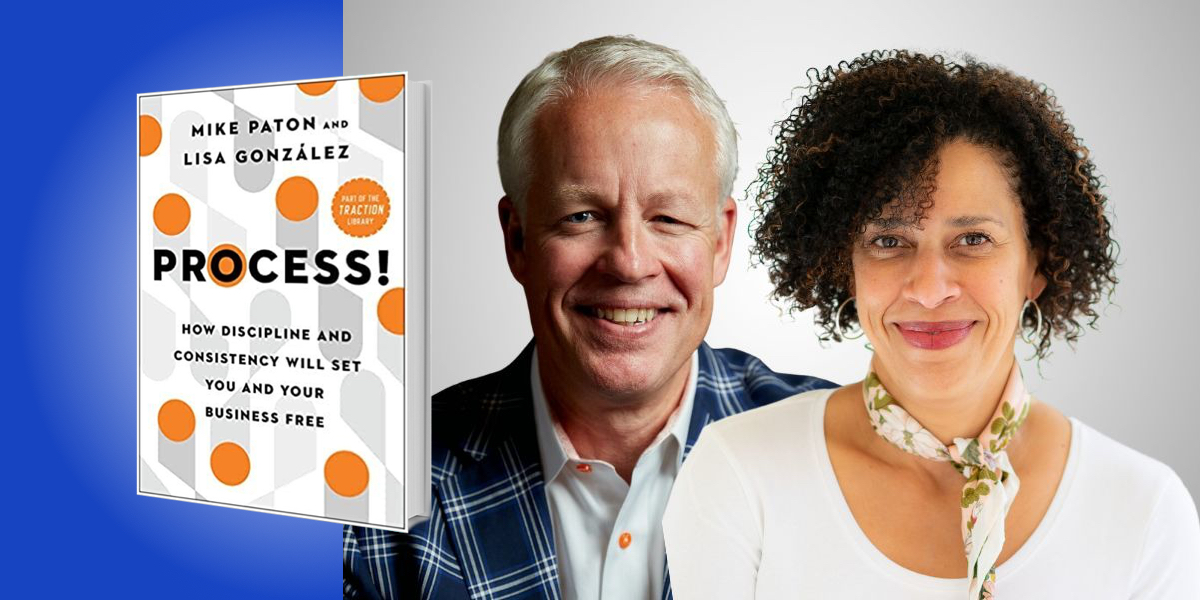Lisa González is a speaker and EOS Implementer. Mike Paton is also an EOS Implementer, and former visionary of EOS Worldwide. EOS (Entrepreneurial Operating System) is a non-software business operating system that has helped tens of thousands of entrepreneurial companies get what they want from their businesses.
Below, Lisa and Mike share 5 key insights from their new book, Process: How Discipline and Consistency Will Set You and Your Business Free. Listen to the audio version—read by Lisa—in the Next Big Idea App.

1. Process deserves every leader’s attention.
What would your business look like if you documented the process for activities that people on your team repeat each day and then trained them to follow the process so that you and your business could consistently get the results you want? By document, I mean you could capture tasks in a checklist to ensure the right steps are followed, or maybe have a screenshot showing the steps team members should take to get the desired results. How would your business run and what would your personal life look like as a result?
Process was created to give entrepreneurial leaders the inspiration and tools that result from documenting core processes and then getting them followed by everyone in the company who uses them. In our experience, when we start discussing process, we see visionaries check their watches, maybe panic or fake illness. I even had a client put his head on the desk and pretend to cry. A lot of entrepreneurs don’t see the need because they’ve been successful thus far without process. Or they fear they don’t have the skills to get it done. But to consistently get the results you want, we need to attack your mindset around documenting your processes.
2. You are process-oriented.
If you tell yourself that you’re not process-oriented, this is a myth. It’s simply not true, for a few reasons.
The first reason is related to human nature in general. When our early ancestors wanted to recreate fire, they figured out the best and most efficient way to consistently do that. They then taught other members of their communities how to duplicate this effort so that the next generation would not have to figure it out on their own. No one wrote this practice down. Maybe they put it on a cave wall, but they figured out the best and right way to do it. Then got others to follow it.
“Determining the right way to get results is what being process-oriented means.”
The same can be true of the way we learned to eat certain foods. Someone figured out which berries were good to eat and which berries were toxic. They communicated what worked to other members of their community, and the rest is history. Modern people can feel reasonably comfortable that the berries we are eating are not toxic.
The survival of humans requires us to be process-oriented, and the same applies to business. If you’re an entrepreneurial leader, when you first started that company, you discovered what makes a customer smile. So, you did more of that. You also captured what didn’t work and figured out a ways to stop doing those things. If you delivered your service in a way that resulted in a one-star Google review, you made sure that didn’t happen again.
Determining the right way to get results is what being process-oriented means. You may not have written it down, but you captured it and duplicated it. When it’s time to scale your business, however, the information that you’re carrying in your head, or maybe conveyed verbally to key employees, must get captured in writing so that you can maintain the level of excellence that made you successful so far.
To scale and create consistently desired results, we can’t just let people figure it out. Not only is it inefficient, but it is also expensive. If we can document and simplify the best way to do routine activities in your business, your business will improve—if not your personal life, too. You are process-oriented. You’re naturally good at it. If you want to grow, it benefits you to formalize it.
3. Make time to document your processes.
No one running a company has ever said they have too much time. In fact, the leaders we work with have an almost superhuman ability to get huge amounts of work done with not enough time, not enough money, and not enough people. Sometimes they even thrive on this. But these leaders don’t have to live in a world of ongoing firefighting. No one can sustain success at this pace without seeing suffering at work, with health, or at home.
Entrepreneurs underestimate the time that is wasted by the lack of attention to process. UCLA coach John Wooden is one of the most successful college basketball coaches ever. He’s famous for gathering new recruits and teaching them not only how to shoot or dribble on that first day, but how to put on socks. Yes, socks. Even though they had important training to dive into, he made sure that they paid attention to the little things, noting “if you don’t have time to do it right, when will you have time to do it over?” When eager team members raced to put on their socks and shoes, he had them slow down and showed them the right way to do it, in order to avoid getting blisters. If they got blisters, they’d lose precious playing time. Such short-sightedness could cost the team a future championship.
“Slow down to go fast.”
Many businesses underestimate the time that the failure to slow down and document processes is costing them. It takes time to backtrack on unhappy customers or remake products. There’s also the time involved in employee turnover that’s caused by lack of process. Recovery from these mistakes takes time, burns goodwill, and costs money. Slow down to go fast.
People tend to overestimate the time it takes to document processes and get them followed. And that’s understandable if you think it’s necessary to document 100 percent of the steps, in 100 percent of processes, and get 100 percent compliance. We call that the 100/100/100 approach, and it’s both overwhelming and ineffective. Instead, our approach is a 20/80 approach, capturing 20 percent of the major steps that can get you 80 percent of the way there. The work that’s involved to get the rest of that 80 percent to 100 percent is just not worth the ROI of your time.
Capture the steps in major core processes to see immediate returns. Employees will be better at their jobs sooner and will stay longer. Leaders will more consistently hit their numbers and complete priorities. The time gained will give them space to create and innovate. The people who love to add detail can provide more detail as time goes on, but initially, the leadership team can agree on the framework for how things are done and create a usable document.
4. Process does not destroy freedom.
If you believe that instilling discipline for process means that you and your people can no longer be free, creative, or innovative, you are not alone. This mistaken belief is widely held and fiercely defended. Entrepreneurs are highly independent people. In fact, one of our entrepreneurs shared that he didn’t like being told what to do, and he assumed other people on his team wouldn’t want to be told either—until he realized that he needed to scale. Other entrepreneurs expressed a concern that if they document company processes, they’ll turn their employees into a bunch of robots. From these viewpoints, people are resisting the very thing they need the most.
The thing destroying freedom is lack of process. Lack of process makes it difficult to train and grow employees. Lack of process results in an inconsistent product, causing customers to complain or stop using your services. Lack of documented processes results in a world where you answer and re-answer basic questions, redirect people, and fix problems caused by people reinventing ways to do work that should be routine.
“It’ll help you and your team spend less time in the trenches and more time thinking, creating, and innovating.”
Our approach to process breaks that cycle simply and efficiently. It’ll help you and your team spend less time in the trenches and more time thinking, creating, and innovating. True freedom is encapsulated by a quote from Isidore Sharp, founder of the beautiful Four Seasons Hotels and Resorts. Mr. Sharp leveraged this commonsense approach to “systemize the ordinary so you can humanize the exceptional.”
At Four Seasons, he encourages leaders, managers, and team members to systemize basic routine, such as checking in a guest at the front desk or cleaning a hotel room. Additionally, he and his leaders encourage team members to use their judgment and discretion to create truly memorable experiences. Guests joyfully share stories of team members remembering their names and their drink orders, providing warm hats for their children on a surprisingly cold day, or hand-delivering a book from a favorite author. Sharp and his team built Four Seasons into one of the world’s top luxury hotel chains.
Another favorite example of mine is a client that streamlined their new hire process. At this company, they were passionate about celebrating the new employee when they joined, as opposed to the hundreds of companies who throw going away parties. Here, the employee arrives to discover their workstation decorated with streamers, flowers, and balloons. A personalized card and a bottle of wine gets sent to the new employees’ family, welcoming them to the team, and a mentor meets with the employee for lunch. That’s the type of innovation, experiences, and freedom that documented processes provide.
5. It has to be you.
As a leader, this is not work that you can hand off to your best person. You have to muster the energy and passion that only visionary leaders can provide to their business. Your genuine support will help you and your team run your business more smoothly, get better results, and increase the business value. You’ll have more time for important stuff at work and at home. Your peace of mind will improve. You’ll have more fun. It will require sweat, determination, and hard work, and it’s absolutely worth it. That is how discipline and consistency can set you and your business free.
To listen to the audio version read by co-author Lisa Gonzalez, download the Next Big Idea App today:
































